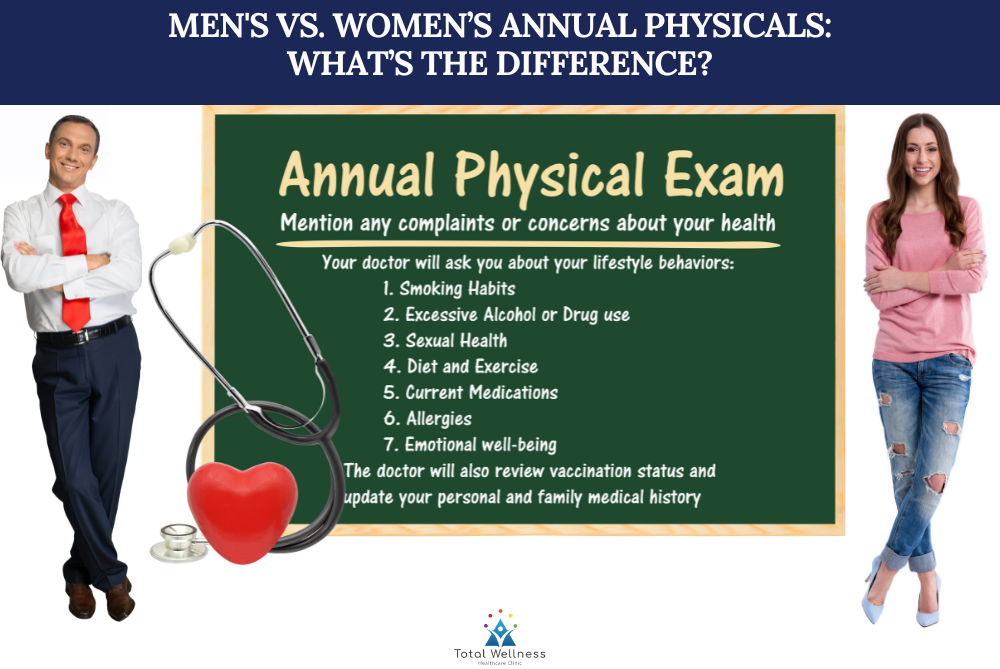
Annual physicals are essential for monitoring your health, preventing illness, and catching potential problems early. But did you know that there are key differences between men’s health and women’s health check-ups? While both include many of the same core assessments, certain gender-specific exams are tailored to the unique needs of each individual.
At Your Total Wellness Clinic, we offer comprehensive annual exams designed to support both men and women at every stage of life. Here’s a closer look at what differentiates these physicals and why personalized care matters.
What Do Annual Physicals Have in Common?
Before diving into the differences, it’s important to know that many components of the annual physical are the same for both men and women. These include:
- Vital signs (blood pressure, heart rate, respiration, temperature)
- Height, weight, and BMI calculation
- Health history review (personal and family history)
- Lifestyle assessment (diet, exercise, alcohol/tobacco use)
- Blood work (cholesterol, glucose, thyroid function, and more)
- Vaccinations update
- Mental health screening
These evaluations form the foundation of preventive care and help identify early signs of chronic conditions.
Unique Aspects of Women’s Health Check-Ups
Women face specific health challenges throughout their lives, especially related to reproductive and hormonal health. Annual check-ups for women often include:
1. Breast Exam
A clinical breast exam is performed to check for lumps or abnormalities. Depending on age and risk, your provider may recommend a mammogram.
2. Pelvic Exam and Pap Smear
A pelvic exam evaluates the health of reproductive organs. A Pap smear screens for cervical cancer and is typically recommended every 3 years for women aged 21-65.
3. Menstrual and Reproductive Health Review
Your doctor will discuss any issues with menstrual cycles, fertility, contraception, or symptoms related to menopause.
4. Bone Density Screening
Postmenopausal women or those at risk for osteoporosis may be advised to undergo a bone density scan.
Unique Aspects of Men’s Health Check-Ups
Men also have gender-specific needs that are addressed during their annual physicals:
1. Prostate Health Evaluation
For men over 50, or younger if at high risk, a prostate exam or PSA blood test may be recommended to screen for prostate cancer.
2. Testicular Exam
The doctor checks for lumps, swelling, or other signs of testicular abnormalities.
3. Hormone and Sexual Health
Men experiencing low energy, reduced libido, or mood changes may benefit from testosterone level testing.
4. Abdominal Aortic Aneurysm Screening
For men aged 65-75 with a history of smoking, screening for abdominal aortic aneurysm (AAA) is often recommended.
Gender-Specific Health Counseling
Beyond physical exams, your provider may offer lifestyle guidance that is gender-specific:
- For women: pregnancy planning, prenatal care, menopausal support, bone health
- For men: erectile dysfunction, heart health, stress and performance issues
Gender-based trends also influence risk for conditions like cardiovascular disease, mental health concerns, and cancer, so having honest discussions with your provider is key.
My Personalized Care Matters
No two patients are alike. Factors like age, genetics, lifestyle, and medical history influence which screenings or preventive steps are right for you. Gender-specific exams ensure your care plan is not only comprehensive but relevant.
Building a strong relationship with your primary care provider allows for better health outcomes, earlier interventions, and a clear understanding of your body’s needs over time.
Your Partner in Preventive Care
At Your Total Wellness Clinic, we provide thoughtful, thorough, and gender-specific annual exams. Whether you’re due for your yearly check-up or have specific concerns about men’s health or women’s wellness, we’re here to support your journey.
Schedule your annual physical today and take the next step toward personalized, proactive health.
Your Total Wellness Clinic — Comprehensive Care for Every Body.
